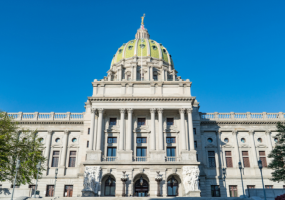 State lawmakers are still negotiating a final budget deal more than two weeks after the June 30 deadline.
State lawmakers are still negotiating a final budget deal more than two weeks after the June 30 deadline.
The principal negotiators, House Majority Leader Matt Bradford, Senate Majority Leader Joe Pittman, and Gov. Josh Shapiro, have reportedly been meeting regularly for weeks to reach an agreement. While each side has said they are making progress, no specific details have been shared. Gov. Shapiro called the talks respectful and productive but added, “We’re not there yet.”
Last Monday, the Democrat-majority state House passed a $50.6 billion spending plan, roughly $900 million less than the $51.5 billion budget Gov. Josh Shapiro proposed in February but still $2.7 billion more than last year. All sides acknowledged the vote was largely procedural and not reflective of a final product, but leaders in both chambers and the governor’s office have framed it as a step toward unlocking stalled negotiations.
Still, Republicans say the House-passed bill spends too much and lacks a clear path to cover future obligations, arguing that Pennsylvania’s long-term budget is unsustainable without slowing increases to spending and policies that drive economic growth, such as energy development and tax reform.
While discussions have reportedly been productive, consensus remains elusive on two of the most contentious issues: increased funding for public transit and potentially regulating and taxing skill games.
The House passed a separate bill in June that would increase the share of existing Sales and Use Tax revenue dedicated to public transit, authorize bonding for road and bridge projects, and establish a Transportation Funding Advisory Commission to study and recommend long-term infrastructure funding solutions. That measure is not reflected in the budget bill passed last Monday. Nor is there any agreement on the appropriate tax rate on skill games; the governor has proposed taxing the machines at 51 percent, while separate Senate bills have called for 16 percent and 35 percent, respectively.
The PA Chamber is also continuing our ongoing advocacy to improve Pennsylvania’s tax climate to encourage growth and investment.
We were proud to lead a bipartisan coalition to pass Act 53 of 2022 to gradually cut in half Pennsylvania’s Corporate Net Income (CNI) tax rate, which was 9.99 percent and currently stands at 7.99 percent. It is scheduled to drop to 7.49 percent on Jan. 1, 2026, and then by 0.5 percentage points each year until reaching 4.99 percent in 2031.
Unfortunately, this important tax reform is only counted as a deficit in the context of the state budget, even though it is helping to recruit employers and broaden the tax base. Accordingly, we have been actively resisting suggestions to pause the phasedown schedule.
Additionally, the Net Operating Loss (NOL) carryforward cap, which was increased as part of the 2024 budget reforms championed by the PA Chamber, is currently at 40 percent for tax year 2025. It will rise to 50 percent in tax year 2026 and continue increasing by 10 percentage points each year until reaching 80 percent in tax year 2029, bringing Pennsylvania in-line with nearly every of state in the nation and the federal deduction cap
While details on the current budget negotiations have been scarce, Gov. Shapiro said he is encouraged by recent talks with House and Senate leadership. He acknowledged the need to balance investment with fiscal restraint, adding, “We all understand each other’s perspectives. We also understand that our job is to compromise.”